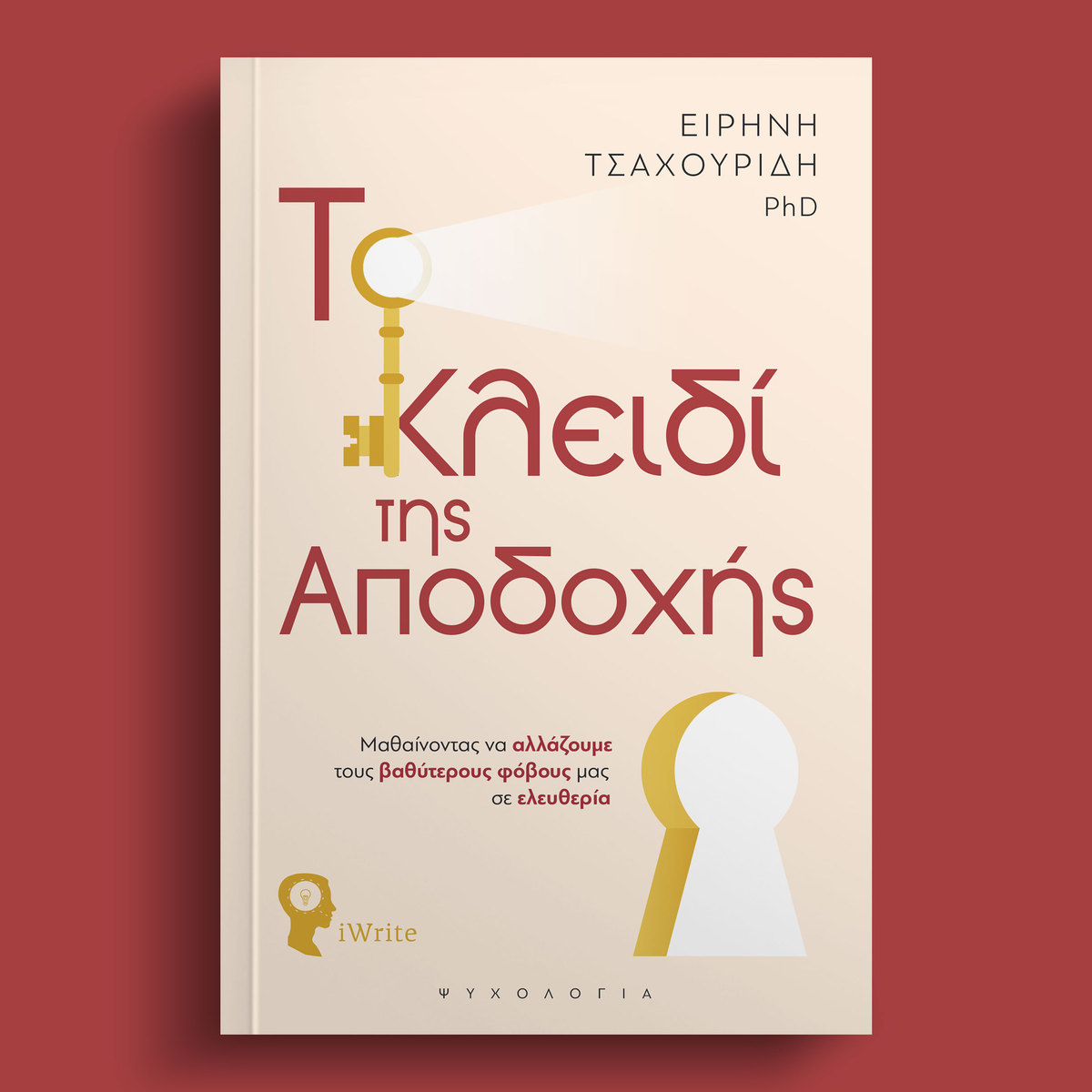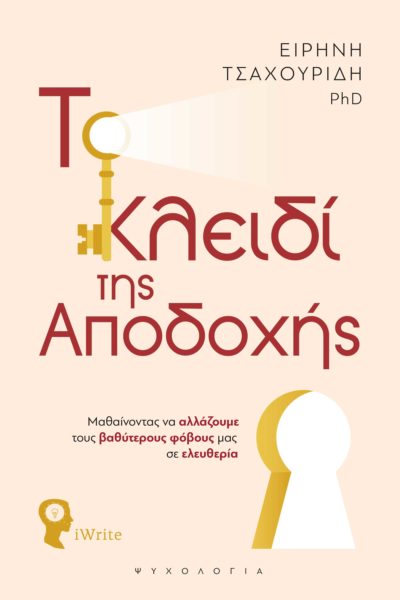Περί ψυχολογίας αλλά και για το νέο βιβλίο της με τίτλο «Το κλειδί της αποδοχής», η συγγραφέας Ειρήνη Τσαχουρίδη μοιράστηκε μαζί μας τα παρακάτω:
Υπάρχει βιβλίο θετικής ψυχολογίας;
Η Θετική Ψυχολογία είναι ένας κλάδος που ασχολείται με την άνθιση και την ευημερία. Το ότι η Θετική Ψυχολογία εστιάζει στην «θετική απόκλιση» και όχι στην θεραπεία, δεν σημαίνει πως παραγνωρίζει τις δυσκολίες και τα προβλήματα. Αντίθετα, εστιάζει στην νοηματοδότησή τους και στο πώς θα μπορούσαμε να ακολουθήσουμε μία όσο το δυνατόν πιο εποικοδομητική προσέγγιση σε ό,τι συμβαίνει στην ζωή μας. Το Κλειδί της Αποδοχής, ως βιβλίο θετικής ψυχολογίας προσπαθεί να βοηθήσει τους αναγνώστες του να κάνουν ακριβώς αυτό, να επανεξετάσουν το Νόημα που αποδίδουν σε όσα συμβαίνουν στις συμβολικές ιστορίες που περιλαμβάνει και εν συνεχεία στην ζωή τους.
Τι εστί νοηματοδότηση;
Πολύ συχνά στην ζωή μας εστιάζουμε στο τι συμβαίνει και βιαζόμαστε να το κατατάξουμε ως καλό ή κακό, τείνοντας να πάρουμε πότε μία στάση εφησυχασμού και πότε μία στάση δαιμονοποίησης των όσων συμβαίνουν. Μήπως όμως τελικά η ζωή μας θα ήταν διαφορετική αν συνειδητοποιήσουμε πως αυτό που αποκαλούμε καλό έχει πιθανούς κινδύνους και πιθανά μειονεκτήματα που σε πρώτη ανάγνωση δεν είναι εμφανή, ενώ αντίστοιχα αυτό που αποκαλούμε κακό έχει κρυμμένα κέρδη και ευλογίες που δεν μπορεί να σκεφτεί εύκολα το συμβατικό μυαλό μας; Επιθυμώντας να αποφύγω να μιλήσω ακαδημαϊκά και ερευνητικά, θα μοιραστώ ένα προσωπικό βίωμα μαζί σας.
Πολλές φορές στην ζωή μου έχω συνειδητοποιήσει πως αυτή η νοηματοδότηση είναι κομβικής σημασίας. Πολλές φορές τα «καλά σενάρια» και οι επιτυχίες αποδείχθηκε πως είχαν ένα τίμημα που δεν μπορούσα εύκολα να υπολογίσω. Άλλες φορές πάλι αυτά που απέφευγα και θεωρούσα δύσκολα και αρνητικά, με οδήγησαν σε μονοπάτια που δεν μπορούσα πριν να φανταστώ.
Νοηματοδότηση και συναισθηματική ευφυΐα
Και όμως, το συναίσθημα με το οποίο ζούμε την κάθε στιγμή καθορίζεται από το πώς ερμηνεύουμε τα γεγονότα που μας συμβαίνουν την κάθε στιγμή και όχι από την «ευφυΐα» που θα ανακαλύψουμε σε βάθος χρόνου. Το τι νόημα λοιπόν αποδίδουμε σε όσα συμβαίνουν είναι καταλυτικό για την ευημερία μας και θα καθορίσει την αναλογία θετικών και αρνητικών συναισθημάτων με τα οποία θα ζήσουμε την καθημερινότητά μας. Πολλοί θα πουν τώρα, “και τι μπορώ να κάνω; Έχω συνηθίσει να νοηματοδοτώ τα όσα συμβαίνουν με έναν συγκεκριμένο τρόπο”. Και όμως, τα καλά νέα είναι πως υπάρχει περιθώριο να βελτιώσουμε τις νοηματοδοτήσεις μας. Και όταν μιλώ για βελτίωση της νοηματοδότησης, δεν εννοώ το να πούμε ότι το κακό είναι καλό! Αυτού του είδους η εντός πολλών εισαγωγικών «θετική» σκέψη μόνο εφικτή δεν είναι και σε καμία περίπτωση δεν έχει να κάνει με την Θετική Ψυχολογία.
Η πραγματική βελτίωση της νοηματοδότησης έχει να κάνει με το “ανοίξουμε” την εσωτερική μας ματιά και να πάμε πέρα από τον διαχωρισμό των συμβάντων σε “καλά” και “κακά”. Να πάμε πέρα από τα δίπολα και να αρχίσουμε να αντιλαμβανόμαστε και να αποζητούμε ενεργητικά την πολυδιάστατη και δυναμική φύση των καταστάσεων και των συμβάντων.
Το Κλειδί της Αποδοχής υιοθετώντας την αφηγηματική προσέγγιση, προσπαθεί να βοηθήσει τον αναγνώστη να κάνει ακριβώς αυτό, δηλαδή να εξασκηθεί σε μία όσο το δυνατόν πιο “ανοιχτή” νοηματοδότηση των συμβάντων της ζωής. Με αυτόν τον τρόπο το βιβλίο προσπαθεί να εφαρμόσει τις αρχές της Θετικής Ψυχολογίας, βοηθώντας μας να χτίσουμε μία πιο πάγια και διαρκή ευημερία.
Πώς προσπαθεί να το κάνει αυτό;
Μέσα από τις ιστορίες που αφηγείται, οι οποίες έχουν ως στόχο να βοηθήσουν τον αναγνώστη να εξασκηθεί σε μία πιο “ανοιχτή” και ολιστική ερμηνεία των γεγονότων της ζωής. Η γλώσσα της αφήγησης και των εικόνων έχει τεράστια δύναμη στο να επικοινωνεί στον αναγνώστη ιδέες και βιώματα δίχως να επιβληθεί, δίχως να τον κάνει παθητικό αποδέκτη. Αυτή η ενεργητική σχέση του αναγνώστη με τις ιστορίες βοηθά σε μία αληθινή εμπλοκή του αναγνώστη και στο σταδιακό χτίσιμο ενός δικού του βιώματος μέσα από τις ιστορίες. Όσο πιο συμβολικά γραμμένη είναι μία ιστορία τόσο πιο “ανοιχτά” είναι τα διδάγματά της, τόσο πιο ουσιαστικό και βαθύ είναι αυτό που επικοινωνεί, και προπάντων τόσο πιο εύκολο γίνεται για τον αναγνώστη να συμβιώσει την ιστορία και να εντάξει δικά του βιώματα μέσα σε αυτήν.

Το βιβλίο, οι ιστορίες του και η έννοια της θετικής ψυχολογίας
Το ποτάμι της ζωής αποτελεί την πρώτη ιστορία του βιβλίου. Η ιστορία αυτή προσκαλεί τον αναγνώστη να νοηματοδοτήσει με έναν ευρύτερο τρόπο τα απρόβλεπτα της ζωής, αυτό το άγνωστο που μας συμβαίνει και δεν μπορούμε να κάνουμε κάτι διαφορετικό πέραν από το να το ερμηνεύσουμε με έναν πιο ολιστικό τρόπο.
Το δώρο του Σκοπού αποτελεί την δεύτερη ιστορία του βιβλίου, μία ιστορία που φιλοδοξεί να αποδομήσει πλήρως την έννοια του Καλού και του Κακού, του θετικού και του αρνητικού. Τελικά μήπως όλα θα ήταν διαφορετικά αν δεν είχαμε έτοιμες και προκατασκευασμένες μηχανικές-αυτόματες ιδέες για το τι είναι Καλό και Κακό; Μήπως έχουμε δει τους ανθρώπους της ζωής μας να κάνουν το ίδιο με τους ήρωες της ιστορίας; Μήπως έχει τύχει να το κάνουμε και εμείς οι ίδιοι;
Ο φάρος που δεν του άναβε κανείς το φως αποτελεί την τρίτη ιστορία του βιβλίου. Η ιστορία αυτή αμφισβητεί τον ρόλο που νομίζουμε πως παίζουν οι άλλοι για την ευημερία μας και θέτει τον σπόρο του να επανεξετάσουμε τι αληθινά σημαίνει ευημερία και ποιος ο ρόλος των σχέσεων για την επίτευξή της.
Η τέταρτη ιστορία αυτού του βιβλίου είναι η πέτρα της συγχώρεσης, μία ιστορία που μας προσκαλεί να αναθεωρήσουμε το πώς βλέπουμε την συγχώρεση. Η Θετική Ψυχολογία αναγνωρίζει την συγχώρεση ως μία βασική αρετή-δύναμη χαρακτήρα. Κατανοούμε όμως πραγματικά τι σημαίνει συγχώρεση ή μήπως νοηματοδοτούμε λάθος την σημασία της;
Η αιμορραγία της προσφοράς αποτελεί την πέμπτη ιστορία του βιβλίου. Είναι μία ιστορία που μας ζητά να αντικρίσουμε με μία πιο ανοιχτή ματιά το τι σημαίνει “προσφέρω” στους άλλους και κάνω κάτι “για χάρη των άλλων”. Μήπως εγκλωβιζόμαστε σε έναν κύκλο προσφοράς που τελικά μόνο “φαύλος” μπορεί να είναι, όχι για τους άλλους, αλλά πρωτίστως για εμάς; Πώς νοηματοδοτώ την κάθε μου πράξη; Μήπως τελικά αυτό έχει σημασία και όχι μόνο η ίδια η πράξη;
Και φυσικά πώς νοηματοδοτώ το «τέλος», τον «θάνατο», και κυρίως τον φόβο αυτού του τέλους και του θανάτου. Πόσο διαφορετικά θα συμπεριφερόμουν αν αυτό τον φόβο τον νοηματοδοτούσα διαφορετικά; Μήπως τελικά αυτή η διαφορετική νοηματοδότηση θα άλλαζε την ζωή μου; Αυτά είναι μερικά από τα ζητήματα που θίγονται στην ιστορία Η πεταλούδα της αιωνιότητας.
Ακολουθεί Η περιπλάνηση του Οδυσσέα στα παράθυρα του χρόνου, η έβδομη ιστορία του βιβλίου που μας καλεί να νοηματοδοτήσουμε διαφορετικά το πώς βλέπουμε τον Σκοπό της ζωής μας. Τι καλούμαι να κάνω στην ζωή μου; Πώς μπορώ να δω τον Χρόνο; Πώς μπορώ να τον αξιοποιήσω; Πόσο κομβικό είναι αυτό για μένα και την ευημερία μου; Ίσως απόλυτα κομβικό αν σκεφτούμε πως ο τρόπος που αντιλαμβανόμαστε τον Σκοπό της ζωής ωθεί κάθε δράση μας σε καθημερινό επίπεδο.
Το βιβλίο κλείνει με μία ιστορία μεγαλύτερης έκτασης, το ταξίδι της Αρετής στο Άγνωστο. Αυτή η ιστορία συνθέτει και επεκτείνει όλα τα παραπάνω ζητήματα βάζοντάς τα σε ένα ευρύτερο πλαίσιο, παρακολουθώντας την ιστορία της ηρωίδας σε ένα ταξίδι ζωής. Μέσα σε αυτό το ταξίδι την βλέπουμε να νοηματοδοτεί αλλιώς το καλό και το κακό, να αποδομεί τον ορισμό της για την ευημερία ξανά και ξανά, να συναντά το εσωτερικό της παιδί, να συνομιλεί με αυτό και να κάνει ένα βαθύ εσωτερικό ταξίδι. Σε αυτό το ταξίδι άλλαξαν πολλά και πρωτίστως ο τρόπος που νοηματοδοτούσε την σχέση της με τους άλλους, αλλά και με κομμάτια του εαυτού της. Ίσως αυτό τελικά να είναι το πραγματικό Άγνωστο, το οποίο καλούμαστε να δούμε αλλιώς, με μία διαφορετική και πιο “ανοιχτή” εσωτερική ματιά.
Εν κατακλείδι
Το Κλειδί της Αποδοχής αποτελεί μία προσπάθειά μου να επικοινωνήσω με έναν δικό μου τρόπο το τι πραγματικά σημαίνει να ξανααντικρίζουμε τα συμβάντα της ζωής μας, τις σχέσεις με τους άλλους και πρωτίστως με τον Εαυτό μας και όλα τα κομμάτια που τον συνθέτουν. Μέσα από αυτήν την νοηματοδότηση μπορούμε σταδιακά να αρχίσουμε να απελευθερωνόμαστε από την αυτόματη και μηχανική αντίληψη των συμβάντων της ζωής και να χτίζουμε μία ευημερία πιο πάγια και πιο διαρκή που δεν θα εξαρτάται ολότελα από ό,τι συμβαίνει εξωτερικά.
Δεν έχουμε την δύναμη να αλλάξουμε τα όσα συμβαίνουν γύρω μας, όμως σίγουρα μπορούμε να γίνουμε εμείς πιο ανοιχτοί στο πώς θα νοηματοδοτήσουμε τα όσα συμβαίνουν. Τότε είναι που θα μπορέσουμε να δράσουμε αληθινά και όχι απλά να αντιδράσουμε. Τότε είναι που θα καταλάβουμε τι σημαίνει να υιοθετήσουμε μία εποικοδομητική προσέγγιση και θα αρχίσουμε να βλέπουμε τι πραγματικά σημαίνει η Θετική Ψυχολογία.
Βρες το ιδανικό βιβλίο ψυχολογίας για σένα από τις Εκδόσεις iWrite


